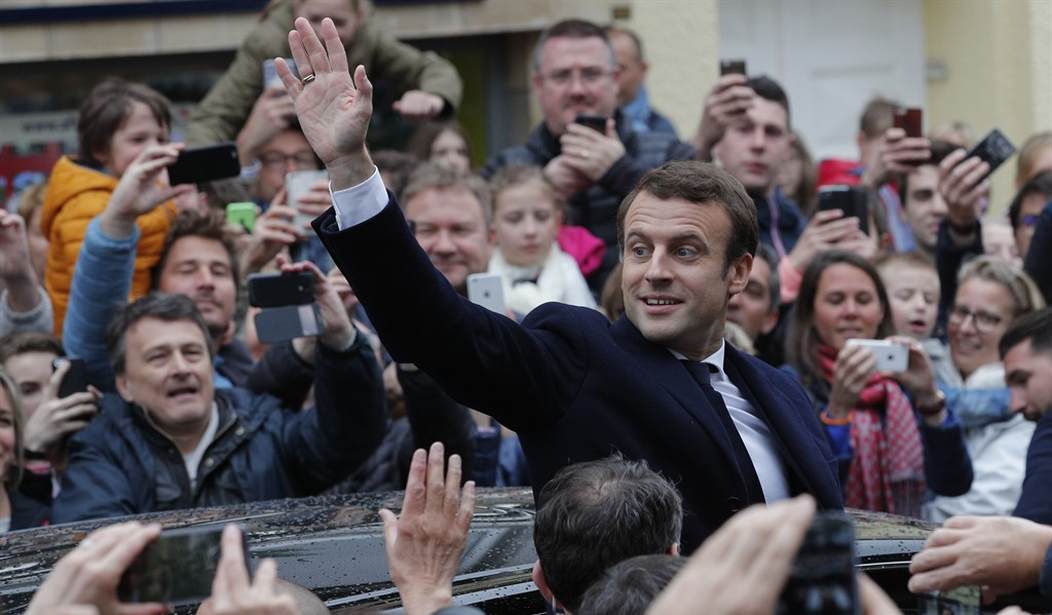Update: 2:15 (Jazz) It was over as soon as the polls closed and it wasn’t even close. If anything, Macron may have exceeded the projected margin by a small amount, but the polls didn’t miss by much. Even with the relatively light turnout, he defeated Marine Le Pen with better than 60% of the vote. (Reuters)
Emmanuel Macron was elected president of France on Sunday with a business-friendly vision of European integration, defeating Marine Le Pen, a far-right nationalist who threatened to take France out of the European Union, early projections showed.
The centrist’s emphatic victory, which also smashed the dominance of France’s mainstream parties, will bring huge relief to European allies who had feared another populist upheaval to follow Britain’s vote to quit the EU and Donald Trump’s election as U.S. president.
The 39-year-old former investment banker, who served for two years as economy minister but has never previously held elected office, will now become France’s youngest leader since Napoleon with a promise to transcend outdated left-right divisions.
That 40% Marine Le Pen brought in still represents more than the National Front has ever scored in France by a fair margin, but it’s still one in the L column. Now comes the work of assembling some sort of majority government in support of Macron, who doesn’t have all that many natural allies in the legislature. Le Pen, for her part is vowing to be back again in the next cycle and keep on fighting.
Original article continues below
This is it. The final electoral battle in France is finally upon us. Results should start coming in around the time this article posts so we’ll update at the top as in the past. Le March socialist upstart Emmanuel Macron is still slated as a roughly 20 point favorite over National Front candidate Marine Le Pen, but there remain serious questions over the accuracy of the voter model this year. (Frankly, I remain unconvinced that it’s more than 20 points worth of questions, but we’ll know soon enough.) I’m not going to put spoilers in here and it’s still an estimate, but the Harris Poll has put out their own exit poll numbers an hour early and you can see a tweet about it here if you like.
The BBC is reporting that turnout is “sharply down” so far, with just over 65% being recorded at five o’clock local time, three hours before the polls close. This is the figure that most observers are watching. If the turnout numbers were essentially on par with other general elections they could probably have a lot more confidence in the polling figures. But much as with American elections, the lower the turnout, the more unpredictable the results. Who is staying home and why? With the two, main establishment parties knocked out of the race in the first round, will a significant number of the “traditional” voters be too turned off to show up and vote? If so, that can open up the door a bit wider for a wild card like Le Pen. And nobody really has any idea how much of an effect (if any) the massive leak of hacked documents from Macron’s campaign on Friday is having.
The Gray Lady has a few of the key things to watch while we wait for the results. One of the biggest concerns is the political landscape that will be facing the winner. The French people have concerns familiar to voters in the United States over jobs, the economy and terrorism. But neither candidate represents one of the major parties and the winner will find a hard time collecting allies in the legislature.
The economy is the electorate’s main concern, and the next president will have to tackle high unemployment and sluggish growth while also addressing the worries of blue-collar workers about globalization and immigration.
Security is also a major concern, as reflected in a vicious debate on Wednesday in which the two candidates sparred over their antiterrorism policies and an attack in Paris that occurred just days before the first round of voting.
But the most pressing issue for France’s next president will be the legislative elections. Because neither candidate is from a mainstream political party, both will struggle to get enough representatives elected to the National Assembly, France’s lower and more powerful house of Parliament, to support their agenda.
They expect to have an official call right after the polls close, but if it’s coming down to the wire we may be waiting a bit longer. It’s been a long and certainly interesting battle in France, and the country will be facing a fairly different future than they are used to when this is over, no matter who wins.







Join the conversation as a VIP Member